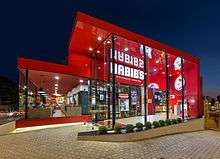Habib's
 | |
| Private | |
| Industry | Restaurants |
| Founded | 1988 |
| Headquarters | São Paulo, Brazil |
Key people | Alberto Saraiva, (Chairman) |
| Products | Middle Eastern Cuisine |
| Revenue |
|
Number of employees | 14,000 |
| Website | www.habibs.com.br |
Habib's is a Brazilian fast food company that specialises in Middle Eastern cuisine. It has more than 475 outlets[1] (many of them self-owned) across the country and has recently begun expansion into foreign markets. It is known for very low prices and exotic dishes. Middle Eastern dishes are very popular in Brazil ever since the immigration of people from that area (particularly Lebanon and Syria) into Brazil, despite their numbers being less than 0.48% of the overall population.
History
Habib's was founded by a Portuguese-born baker, Alberto Saraiva, who had no particular ties to the Middle East himself, got the idea early in 1988 after an ailing old man of Arab descent applied for a job in his bakery. With no job at hand for the man to apply to, but upon learning that he had been a cook back in his home land, Mr. Saraiva decided to open a small fast-food restaurant focused on Middle-Eastern fast-food, unheard at the time in Brazil, believing the success could rely on the novelty of it, and hired the man. The first Habib's restaurant was opened later that same year.[2]
Before Habib's, Middle Eastern cuisine, despite being popular, was not readily available and the prices were usually high. The repressed demand was strong and people queued in front of the restaurant almost since the first day. Catering to this demand, Habib's soon started to grow and became one of Brazil's most thriving businesses. Habib's is currently the biggest Arabic fast-food in the world and the third biggest fast-food company in Brazil.
Business model
Habib's serves popular Middle Eastern dishes, like tabouleh, kibbeh or sfiha, along with Brazilian sandwiches like bauru or beirute. Prices are usually low and they boast having the fastest fast-food service. In São Paulo, they advertise that telephone orders not delivered in less than 28 minutes will not be charged.
About 45% of the 475 Habib's restaurants are owned by the founder Alberto Saraiva; the others are operated under franchise
The most popular Habib's products at Habib's are the sfiha (a small, round flatbread topped with minced beef or cheese) and the kibbeh (a croquette of beef shaped like a rugby ball with either an olive or some catupiry cheese inside).
Besides the cheap snacks, various set menus are available, ranging from a full Middle Eastern meal to a combination of sfihas, kibbeh, French fries and freshly squeezed fruit juice. Unusually for fast-food restaurants, a waiter takes your order at the table, while knives and forks are always provided.
Competition
Low prices and wide options are important because, in the highly competitive Brazilian food market one can find, in addition to traditional restaurants and fast food chains, snack bars serving barbecued meat, churrascarias, street vendors selling snacks or hot-dogs, and, most of all, the ubiquitous self-service restaurants where one serves oneself freely from dozens of options and pays for the weight of their plate (the latter type is especially popular and low-priced, usually with clean and nutritious food).
In such a market, Habib's is set apart by its attention to the customer, low price, high quality (though the quality of the sfihas, which are the cheapest item on the menu, is often cast in doubt by popular opinion) and low operational cost (most Habib's restaurants operate in smaller and less expensive locations than, for instance, McDonald's).
International expansion
Habib's has been probing the foreign market for quite some time, and attempts to set up stores across Mexico were made in 2001.
References
- ↑ "Sobre a Empresa - Sobre o grupo". Ragazzo. Retrieved 2 August 2009.
- ↑ "Nossa História". Habib's. Retrieved 1 December 2014.
External links
| Wikimedia Commons has media related to Habib's. |
